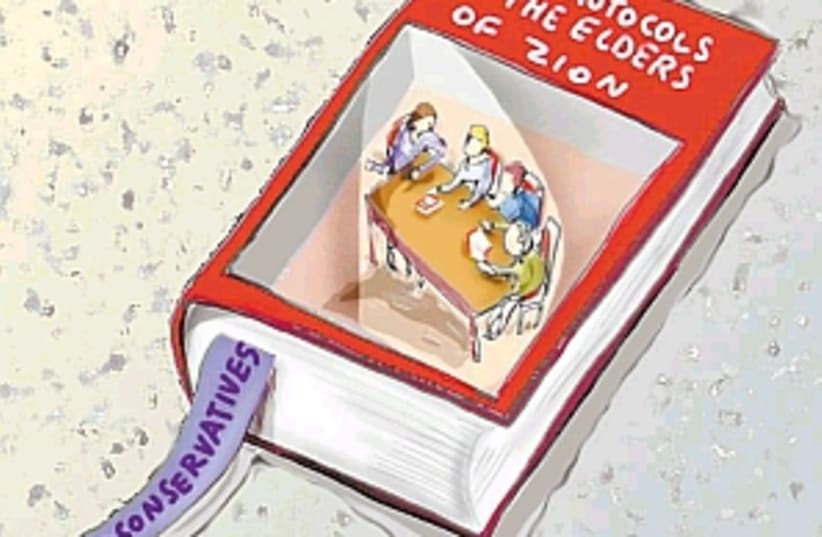Send us your comments >> Tim Allik Your columnist correctly points out that The Protocols of the Elders of Zion was a fraud and a fake. Many inaccurate and just-plain-wrong generalizations are made on the web about all sorts of ethnic and religious groups, including Jews. However, there is a distinction to be made between conjecture and fact. It's not a conspiracy theory to say that Paul Wolfowitz, Richard Perle, Douglas Feith and Lewis Libby all have close ties to the Likud party of Israel, or that they all actively worked to push for the case for the Iraq war - the truth be damned, or that Larry Franklin, charged with passing classified documents to Israel, worked for Feith, or that both Feith and Perle have been cited in the past for allegedly passing along classified US documents to Israel. These guys do not represent Israel, just as Likud does not represent Israel. Most Israelis are for a two-state solution. Most American Jews voted against George Bush, overwhelmingly so. By implying that political criticism amounts to "conspiracy theories" and anti-Semitism, your columnist does the Jewish people much more harm than good. Have the guts to stand for the truth. The truth is this: Jews in Israel are diverse in thought and politics, Jews in America did not support the Iraq War on average more than any other ethnic or religious group did, and the Likud has close ties to the scandals currently unfolding in Washington. Gus Caldas, Gaithersburg, MD, USA: Please do not equate the evidence of wrongdoing in relation to the selling of the Iraq war to the American public to the "Protocols". The evidence of the war pimping is too great and will bring a whole lot of neocons down. Or is this investigation an anti-Semitic conspiracy? Jordan Thornton: Regina, Canada: Riiiight ... There is no group called the Partnership For A New American Century, they have no power in DC, and they are not primarily pro-Zionists. Everything that's happened over the past four years is all in our heads. Since the exposure of Bush/PNAC's many LIES, and the utter failure of its foreign policy, their Useful Idiot support has steadily dwindled. This has allowed us a clearer picture of just who it is that really supports their Fascism, and drives their policies. People are taking detailed notes. Watch the indictments closely. Randy Graham, US: It might be more helpful if Mr. Goldstein addressed the actual facts in the role of the "neocons" in orchestrating the war in Iraq. Is he trying to say that the "neocons" do not exist? Or that even if they exist as an ideological position, they played no role in selling the invasion of Iraq? Is he saying, in fact, that they have no links to the Likud Party? Is he trying to suggest that the alleged Jewishness of many of these "neocons" is a myth or completely irrelevant? I'm actually very interested in his answers. What he actually seems to say is that anyone who raises the question is, a priori, apparently an anti-Semite (or self-hating Jew) and their reasoning is simply a version of the Protocols of the Elders of Zion dressed up in a modern raiment. His argument seems to be, "we know the Elders of Zion was an anti-Semitic fraud, ergo any discussion of "neocons" or Israeli interests in promoting the invasion of Iraq is a comparable anti-Semitic hoax. We know the "Elders of Zion" were imaginary. So apparently we can conclude that Richard Perle, Paul Wolfowitz, Douglas Feith, Lewis Libby, William Kristol, Eliot Abrams, Charles Krauthammer, etc. are also imaginary? Goldstein could argue, I suppose, that these men do not share enough ideologically to label them collectively as "neocons". He could try to argue that they have little influence on U.S. policy decisions. Or that they have little motivation to promote perceived Likud interests. He could argue that real the "neocons", assuming that they even exist, are powerful figures such as Cheney, Rumsfeld, and Rice. I would be interested to read and consider these arguments based on relevant facts. He eschews all of them in favor of a sweeping ad homonym attack against anyone who even seeks an answer to these questions.
| More about: | Charles Krauthammer, Paul Wolfowitz, Bill Kristol, Lawrence Franklin |
